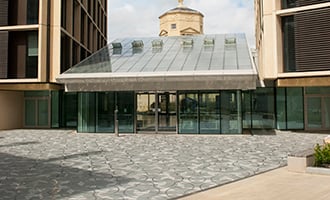
Mathematics and Philosophy
Course overview
UCAS code: GV15
Entrance requirements: A*A*A with the A*s in Maths and Further Maths if available.
Course duration: 3 years (BA); 4 years (MMathPhil)
Subject requirements
Required subjects: Maths
Recommended subjects: Further Maths
Helpful subjects: Not applicable
Other course requirements
Admissions tests: MAT
Written Work: None
Admissions statistics*
Interviewed: 34%
Successful: 10%
Intake: 16
*3-year average 2022-24
Maths contact
Email: undergraduate.admissions@maths.ox.ac.uk
Philosophy contact
Tel: +44 (0) 1865 276926
Email: enquiries@philosophy.ox.ac.uk
Unistats information for this course can be found at the bottom of the page
Please note that there may be no data available if the number of course participants is very small.
About the course
This course brings together two of the most fundamental and widely applicable intellectual skills.
Mathematical knowledge, and the ability to use it, is the most important means of tackling quantifiable problems. Philosophical training enhances the ability to analyse issues, question received assumptions and clearly articulate understanding. The combination provides a powerful background from which to proceed to graduate study in either mathematics or philosophy or to pursue a diverse range of careers.
Historically, there have been strong links between mathematics and philosophy. Logic, an important branch of both subjects, provides a natural bridge between the two, as does the Philosophy of mathematics module.
The degree is founded on the belief that the parallel study of these related disciplines can significantly enhance your understanding of each.
The Philosophy Faculty is the largest in the UK, and one of the largest in the world. We have more than 70 full-time members and admit around 450 undergraduates annually to read our various degrees involving philosophy.
Many faculty members have a worldwide reputation, and the faculty has one of the highest research ratings of any philosophy department in the UK. The Philosophy Library is among the best in the country.
The large number of undergraduates and graduates reading philosophy with a variety of other disciplines affords the opportunity to participate in a diverse and lively philosophical community.
In turn the Mathematics Department, housed in the Andrew Wiles Building, is also one of the largest and best in the UK and contains within it many world-class research groups. This is reflected in the wide choice of mathematics topics available to you, especially in the fourth year.
 | 'I came to Oxford because I wanted to study at one of the best universities in the country. I enjoy the reading in preparation for essays and also the tutorials, especially the philosophical discussions; it’s really interesting to try and make your point clearer and to discover sides of the argument you’d never thought about. Organising your time is very important. If you enjoyed maths and further maths at A-level and you find questions in philosophy interesting then this is definitely the course for you.' Thomas |
Unistats information
Discover Uni course data provides applicants with Unistats statistics about undergraduate life at Oxford for a particular undergraduate course.
Please select 'see course data' to view the full Unistats data for Mathematics and Philosophy.
Please note that there may be no data available if the number of course participants is very small.
Visit the Studying at Oxford section of this page for a more general insight into what studying here is likely to be like.
Mathematics and Philosophy
A typical week
- Years 1 and 2: up to ten lectures a week, two–three tutorials a week
- Years 3 and 4: up to eight lectures a week. Equivalent of eight units taken each year. Weekly tutorials per philosophy subject. Fortnightly classes per mathematics unit.
Tutorials are usually 2-4 students and a tutor. Class sizes may vary depending on the options you choose. There would usually be around 8-12 students though classes for some of the more popular papers may be larger.
Most tutorials, classes, and lectures are delivered by staff who are tutors in their subject. Many are world-leading experts with years of experience in teaching and research. Some teaching may also be delivered by postgraduate students who are usually studying at doctoral level.
To find out more about how our teaching year is structured, visit our Academic Year page.
Course structure
There are two Mathematics and Philosophy degrees, the three-year BA and the four-year MMathPhil. Decisions regarding continuation to the fourth year do not have to be made until the third year.
The mathematics units in this joint course are all from the single-subject Mathematics course. Accordingly the standard in mathematics for admission to the joint course is the same as for admission to the single-subject Mathematics course.
The compulsory core mathematics for the joint course consists mainly of the pure (as opposed to applied) mathematics from the compulsory core for the single-subject Mathematics course. The philosophy units for the Mathematics and Philosophy course are mostly shared with the other courses with philosophy.
In the first year, all parts of the course are compulsory.
In the second and third years some subjects are compulsory. These consist of core mathematics and philosophy and bridge papers on philosophy of mathematics and on foundations (logic and set theory), but you also choose options.
In the fourth year there are no compulsory subjects, and you can do all mathematics, all philosophy, or a combination of the two.
Year 1
Indicative courses | Assessment |
|---|---|
| First University examinations: five compulsory written papers |
Years 2 and 3
Indicative courses | Assessment |
|---|---|
| Final University examinations, Part A (Year 2): two written papers on pure mathematics core and two written papers on mathematics options Final University examinations, Part B (Year 3): four 90-minute exams in mathematics and three three-hour papers in philosophy and either two further 90-minute mathematics exams or one further three-hour philosophy paper (or the equivalent) |
Year 4
Indicative courses | Assessment |
|---|---|
The options listed above are illustrative and may change. A full list of current options is available on the Mathematics website and the Philosophy website. | Final University Examinations, Part C: philosophy subjects include a 5000-word essay. Students study three philosophy subjects or eight mathematics units, or a mixture of the two disciplines. |
The content and format of this course may change in some circumstances. Read further information about potential course changes.
Academic requirements
Qualification | Requirement |
|---|---|
A-levels: | A*A*A with the A*s in Mathematics and Further Mathematics (if available). For those whom Further Mathematics is not available: either A*AAa with A* in Mathematics and a in AS-level Further Mathematics or A*AA with A* in Mathematics. |
Advanced Highers: | AA/AAB |
International Baccalaureate (IB): | 39 (including core points) with 766 at HL (the 7 must be in Higher Level Mathematics) |
Any other equivalent qualification: | View information on other UK qualifications, and international qualifications. |
Wherever possible, your grades are considered in the context in which they have been achieved.
Read further information on how we use contextual data.
Subject requirements
Essential: | Candidates are expected to have Mathematics to A-level (A* grade), Advanced Higher (A grade), Higher Level in the IB (score 7) or another equivalent. |
|---|---|
Recommended: | Further Mathematics is highly recommended. |
The majority of those who read Mathematics and Philosophy will have taken both Mathematics and Further Mathematics at A-level (or equivalent).
If a practical component forms part of any of your science A‐levels used to meet your offer, we expect you to pass it.
If English is not your first language you may also need to meet our English language requirements.
Applying
All candidates must follow the application procedure as shown on our Applying to Oxford pages.
The following information gives specific details for students applying for this course.
Admissions test
Test: | MAT |
|---|---|
Test dates: | 22 & 23 October 2025 |
Registration window: | To be confirmed |
All candidates must take the Mathematics Admissions Test (MAT) as part of their application.
All the information you need to arrange to take your test as well as how best to prepare can be found on your test page.
Written work
You do not need to submit any written work when you apply for this course.
What are tutors looking for?
During the interview for philosophy you will be given the opportunity to show a critical and analytical approach to abstract questions and the ability to defend a viewpoint by reasoned argument.
In mathematics you may find yourself asked to look at problems of a type that you have never seen before. Don’t worry, we will help you! We want to see if you can respond to suggestions as to how to tackle new things, rather than find out simply what you have been taught.
Visit the Mathematics website and Philosophy website for more detail on the selection criteria for this course.
Careers
Graduates secure positions in diverse areas, both in the UK and abroad, such as:
- software development
- teaching
- research
- the public sector, including the Civil and Diplomatic Services
- journalism.
Around 30% of graduates go on to further academic study.
Katherine worked for the Bodleian Libraries after graduating. She found that the logical problem-solving skills and attention to detail she gained from studying mathematics came in useful when tackling new technical challenges in her work and whilst she completed a second graduate degree.
The experience of studying both subjects so intensely, and having to pick up and apply new knowledge quickly, gave her the confidence to work with new subject areas, including legal and medical research libraries.
Note: These annual fees are for full-time students who begin this undergraduate course here in 2025. Course fee information for courses starting in 2026 will be updated in September.
We don't want anyone who has the academic ability to get a place to study here to be held back by their financial circumstances. To meet that aim, Oxford offers one of the most generous financial support packages available for UK students and this may be supplemented by support from your college.
Fees
Fee status | Annual Course fees |
| Home | £9,535 |
| Overseas | £44,880 |
Further details about fee status eligibility can be found on the fee status webpage.
For more information please refer to our course fees page. Fees will usually increase annually. For details, please see our guidance on likely increases to fees and charges.
Living costs
Living costs at Oxford might be less than you’d expect, as our world-class resources and college provision can help keep costs down.
Living costs for the academic year starting in 2025 are estimated to be between £1,425 and £2,035 for each month you are in Oxford. Our academic year is made up of three eight-week terms, so you would not usually need to be in Oxford for much more than six months of the year but may wish to budget over a nine-month period to ensure you also have sufficient funds during the holidays to meet essential costs. For further details please visit our living costs webpage.
Financial support
Home | A tuition fee loan is available from the UK government to cover course fees in full for Home (UK, Irish nationals and other eligible students with UK citizens' rights - see below*) students undertaking their first undergraduate degree**, so you don’t need to pay your course fees up front. In 2025 Oxford is offering one of the most generous bursary packages of any UK university to Home students with a family income of around £50,000 or less, with additional opportunities available to UK students from households with incomes of £32,500 or less. The UK government also provides living costs support to Home students from the UK and those with settled status who meet the residence requirements. *For courses starting on or after 1 August 2021, the UK government has confirmed that EU, other EEA, and Swiss Nationals will be eligible for student finance from the UK government if they have UK citizens’ rights (i.e. if they have pre-settled or settled status, or if they are an Irish citizen covered by the Common Travel Area arrangement). The support you can access from the government will depend on your residency status. |
Islands | Islands students are entitled to different support to that of students from the rest of the UK. Please refer the links below for information on the support to you available from your funding agency: |
Overseas | Please refer to the "Other Scholarships" section of our Oxford Bursaries and Scholarships page. |
**If you have studied at undergraduate level before and completed your course, you will be classed as an Equivalent or Lower Qualification student (ELQ) and won’t be eligible to receive government or Oxford funding
Additional Fees and Charges Information for Mathematics and Philosophy
There are no compulsory costs for this course beyond the fees shown above and your living costs.
Contextual information
Unistats course data from Discover Uni provides applicants with statistics about a particular undergraduate course at Oxford. For a more holistic insight into what studying here is likely to be like, please view the information below and explore our website more widely.
The Oxford tutorial
College tutorials are central to teaching at Oxford. Typically, they take place in your college and are led by your academic tutor(s) who teach as well as do their own research. Students will also receive teaching in a variety of other ways, depending on the course. This will include lectures and classes, and may include laboratory work and fieldwork. However, tutorials offer a level of personalised attention from academic experts unavailable at most universities.
During tutorials (normally lasting an hour), college subject tutors will give you and one or two tutorial partners feedback on prepared work and cover a topic in depth. The other student(s) in your tutorials will typically be doing the same course as you and covering the same topic. Such regular and rigorous academic discussion develops and facilitates learning in a way that isn’t possible through lectures alone. Tutorials also allow for close progress monitoring so tutors can quickly provide additional support if necessary.
Read more about tutorials and an Oxford education
College life
Our colleges are at the heart of Oxford’s reputation as one of the best universities in the world.
- At Oxford, everyone is a member of a college as well as their subject department(s) and the University. Students therefore have both the benefits of belonging to a large, renowned institution and to a small and friendly academic community. Each college or hall is made up of academic and support staff, and students. Colleges provide a safe, supportive environment leaving you free to focus on your studies, enjoy time with friends and make the most of the huge variety of opportunities.
- Each college has a unique character, but generally their facilities are similar. Each one, large or small, will have the following essential facilities:
- Porters’ lodge (a staffed entrance and reception)
- Dining hall
- Lending library (often open 24/7 in term time)
- Student accommodation
- Tutors’ teaching rooms
- Chapel and/or music rooms
- Laundry
- Green spaces
- Common room (known as the JCR).
- All first-year students are offered college accommodation either on the main site of their college or in a nearby college annexe. This means that your neighbours will also be ‘freshers’ and new to life at Oxford. This accommodation is guaranteed, so you don’t need to worry about finding somewhere to live after accepting a place here, all of this is organised for you before you arrive.
- All colleges offer at least one further year of accommodation and some offer it for the entire duration of your degree. You may choose to take up the option to live in your college for the whole of your time at Oxford, or you might decide to arrange your own accommodation after your first year – perhaps because you want to live with friends from other colleges.
- While college academic tutors primarily support your academic development, you can also ask their advice on other things. Lots of other college staff including welfare officers help students settle in and are available to offer guidance on practical or health matters. Current students also actively support students in earlier years, sometimes as part of a college ‘family’ or as peer supporters trained by the University’s Counselling Service.
FIND OUT MORE

Our 2025 undergraduate Open Days will be held on 2 and 3 July and 19 September.
Register to find out more about our upcoming Open Days.
Mathematics Open Days - 26 April and 3 May 2025
Mathematical Sciences Research
Mathematical Sciences at The University of Oxford was one listed as of the best in the UK in the most recent (2021) Research Excellence Framework (REF).
RELATED PAGES
RELATED COURSES
Students interested in this course might also like to consider other Mathematics courses or Computer Science and Philosophy.
FEEL INSPIRED?
Why not have a look at the reading lists for prospective Mathematics and Philosophy applicants on the Maths Department's website?
You can also find out more about the department's research at the Oxford Mathematics Alphabet.
For an introduction to philosophy have a look at Myles Burnyeat and Ted Honderich’s Philosophy, Martin Hollis' An Invitation to Philosophy and Simon Blackburn’s Think.
